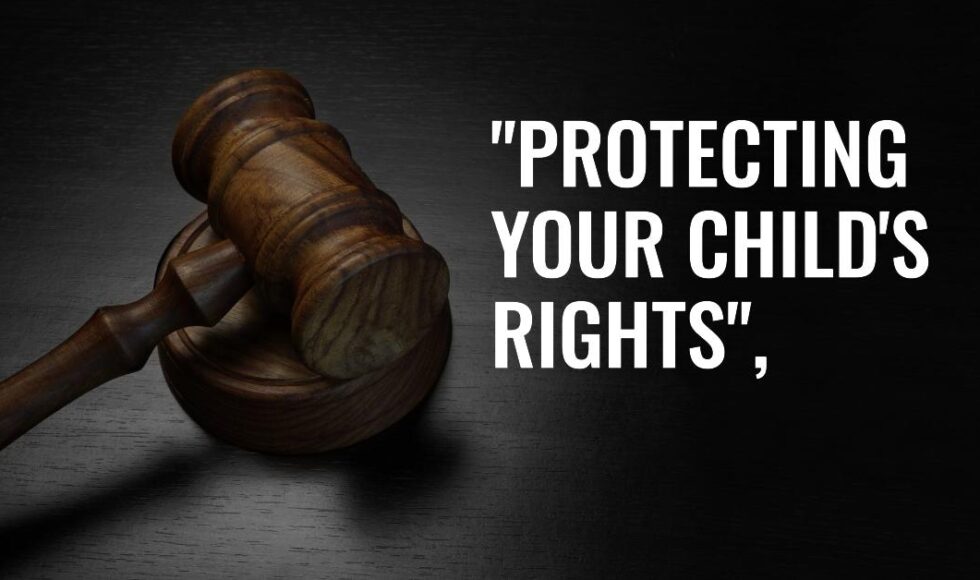As a parent facing divorce, it’s essential to understand your legal rights to guarantee your child’s well-being. Courts prioritize your child’s emotional, physical, and educational needs, often favoring shared parental responsibility. Both you and your co-parent have equal rights regarding medical treatment and financial support obligations, which helps maintain stability in your child’s life. Open communication can minimize conflicts and foster a cooperative co-parenting relationship. For an expanded treatment of custody and emotional support considerations, see the professional resources at the end of this section. These will help you navigate your way through better around this trying time for you and your child.
Best Interests of the Child
Where there is custody and parenting decision, the interests of the child become paramount. You may find courts laying emphasis on the child’s emotional, physical, and educational needs as yardsticks in determining these interests. Normally, each parent is considered to have an equal legal right concerning the welfare of their child, and shared parental responsibility will come into play, unless otherwise ruled by the court.
As you work your way through parenting arrangements, you need to consider the child’s current relationships, your own parenting ability, and, where appropriate, the child’s own views. Full communication between you and your co-parent can often sort out disputes over treatment decisions-such as medical or educational issues-outside of the courts.
Engaging a health professional provides further insight into your child’s needs and furthers the argument for their best interests. Similarly, sustaining early discussions relating to the management of care, alongside complete documentation of current parenting orders, could be effective in evading any post-developing issues.
Notably, it is apparent that focusing on the best interest of the child develops an enabling environment for him or her to thrive and is beneficial in consolidating cooperation and understanding between parents as well.
Introduction to Parental Rights

Understanding parental rights is important in treading through the complex child custody and care arrangements. In Australia, both biological and adoptive parents have equal parental rights and responsibilities, except in circumstances ordered by the court. This principle of equality draws on the importance of what is in your child’s best interest, especially when co-parenting.
You have the legal right to access your child’s medical records and consent to their treatment, ensuring their well-being unless a court order restricts this.
If you’re managing custody arrangements, keep in mind that the Family Court of Australia prioritizes maintaining meaningful relationships with both parents after separation.
Parenting plans may be a meaningful way to detail the arrangement and responsibility of care. Additionally, consider incorporating childcare services into your parenting plans to ensure consistent care and support for your child during transitional periods. These, upon submission to the Family Court for consent orders, become legally binding and provide guidelines toward successful co-parenting.
If you are unsure of your rights or obligations, it is necessary to consult with an attorney. Knowledge of your parental rights equips you to become an effective advocate for your child and best ensures his or her interests are served in this difficult process.
Disagreements about Treatment
Treatment disagreements are tricky to navigate, especially when parents have different opinions on what is best for their child. While prioritizing your child’s well-being is important, it often involves navigating parenting disputes with empathy and legal awareness.
Ideally, these disagreements are sorted out in private and do not escalate into conflict. While both parents have a legal right to give consent for treatment, if an agreement cannot be reached, then the matter may have to be taken for legal advice or to Family Court.
Documentation is very important in these scenarios. Check that any current parenting orders are documented in your child’s medical record, as this can help establish the rights of each parent regarding treatment consent.
Bear in mind that, unless otherwise stated by court order, both parents have equal access to medical information.
In the event of one parent consenting to treatment against the wishes of the other, they may well have to justify their decision later. For these reasons, clear communication, cooperation, and care in the documentation of all interactions are paramount.
In short, striving toward a collaborative approach will not only benefit your child’s interest but also, in the longer term, contribute toward a healthier relationship as co-parents.
Access to Medical Records

Access to their medical history is a fundamental right for all biological and adoptive parents. This access helps in ensuring the best possible well-being of your child and keeps you aware of any ongoing or future treatment he/she may require.
These records can be obtained only by a written request, and at least three points of identification need to be satisfied. This ensures your child’s privacy and also allows access for you when required.
Note that this may include the deletion of sensitive information, especially when sharing records between parents. Note any current parenting orders on the medical records; this ensures that healthcare providers are aware of any custody arrangements and parental rights.
Open communication with your co-parent about the issue of medical record access can prevent conflict and ensure that your child’s best interests remain the focus.
Conflicts of Interest
Conflicts of interest may be challenging to avoid for parents who are separated, but clarity over processes through the health professionals will help to make sure that your child’s health is foremost.
Mental health needs of your child must always be prioritized and not an ongoing conflict with the ex-partner. Where both parents are involved in the treatment, health professionals should avoid conflicts of interest that might compromise care.
If disagreements arise, for instance, healthcare providers may have to stop treating one or both parents altogether in order to continue focusing on your child’s best interests.
To ensure that everyone is on the same page, conflict management practices for separated parents should be part of the training for the practice staff; this can create insight and sensitivity into how these fragile situations must be dealt with.
Additionally, ensure the current parenting orders are documented in your child’s medical records to enable any medical professional to operate within the law and minimize the chances of disputes arising later.
Look after your child’s health and well-being to secure his or her future as you work through the complexities of family issues post-separation.
Your child can have healthier life outcomes with open communication and cooperation between the parties in co-parenting challenges.
Financial Support Responsibilities

Navigating the challenges of co-parenting often includes addressing financial support obligations, an important way to ensure your child’s well-being.
Both biological and adoptive parents have a legal responsibility for financial support, which covers the basic needs such as housing, food, education, and medical care of the children. When parents separate or divorce, the establishment of child support payments must be addressed. Payments are usually based upon income and financial needs of the child, but always done in the best interest of your children.
These agreements can be formalised through the preparation of a Financial Agreement or by Child Support Assessment. The level of fairness should be regularly reviewed as circumstances change.
Child support issues do arise and complicate matters. In such situations, legal intervention or mediation is invoked to help in the amicable resolution of the financial issues as pertained to the law.
Custody and Parenting Time
It can be one of the most sensitive parts of co-parenting: the issue of steering custody and parenting time. Understanding the kinds of possible custody arrangements is key. Physical custody refers to the place where your child will live. Legal custody means the decision-making power about upbringing.
The courts consider what is in the child’s best interests, taking into account parental capacity and the existing relationships. The law presumes that each parent has equal shared parental responsibility, unless a court decides otherwise, so both parents can continue being actively involved in the major decisions.
It is also essential that a comprehensive parenting plan must be prepared on your responsibilities and child care arrangements. Writing such an agreement can, when lodged at the Family Court, make this legally binding on the parties for consent orders.
Mediation is, thus, a process of conflict resolution where you could negotiate the issues of custody in an amicable way before the court takes over. Going through mediation would create a cooperative environment and help all, especially your child.
Legal Resources and Support: Understanding legal rights and how to support one’s child as a parent amidst a divorce or separation may prove daunting. This resource may serve to enlighten them further.
Legal services, such as Seton Family Lawyers, will be able to make you aware of your rights in relation to custody arrangements and support obligations. Utilizing initiatives such as the Lighthouse Project and Family Dispute Resolution can provide alternative dispute resolution options, ensuring you find amicable solutions for your family.
You can also call the Family Relationship Advice Line, which is quite helpful in going through your legal process. The advice line refers you to mediation services that can assist you in sorting out your dispute with minimum conflict.
If you have a low income, then you can apply for legal aid in NSW for the divorce application which will cover some mediation costs.
Additionally, government resources, including guides and booklets, can offer essential insights into parenting plans and custody arrangements. These materials not only clarify your legal standing but also touch on the emotional impact of separation, promoting informed decision-making to prioritize your child’s well-being.
Emotional Well-being of Children
Maneuvering the legal landscape during separation can understandably preoccupy parents, but it’s essential not to overlook the emotional well-being of children during this tumultuous time.
Research has confirmed that high levels of conflict between parents contribute to children developing emotional and behavioral problems. There is, therefore, some relation in their stability regarding a peaceful co-parenting relationship.
Open communication and consistent reassurance about your love provide important reassurance which will help the child process any changes brought about by the separation.
Regular routines and stable living arrangements go a long way toward making them feel more secure. Children thrive on predictability, so working with your co-parent to provide an environment of stability is important.
Children also adjust more easily emotionally when they are supported both from parents and extended family. It can help them adjust with ease through this cooperative parenting.
Do not hesitate to seek professional advice, as counseling and support programs do much to help your child have better mental health outcomes.
Conclusion
In the maze of divorce, the well-being of your child is the connecting thread. Legal rights and responsibilities, if well understood, can weave a supportive environment to nurture emotional health. Just as a tree requires strong roots to grow, so too does your commitment to their best interests ensure that they grow resilient and secure. So embrace the journey ahead, knowing your choices today shape the foundation of their tomorrow. Put their needs first, and watch them thrive.

